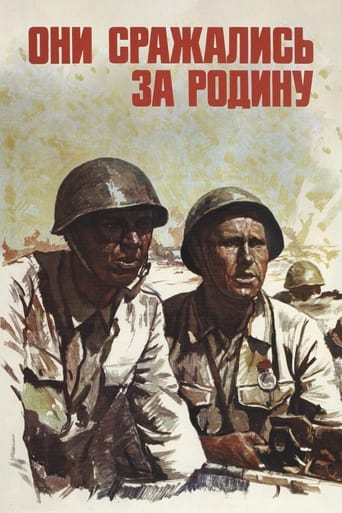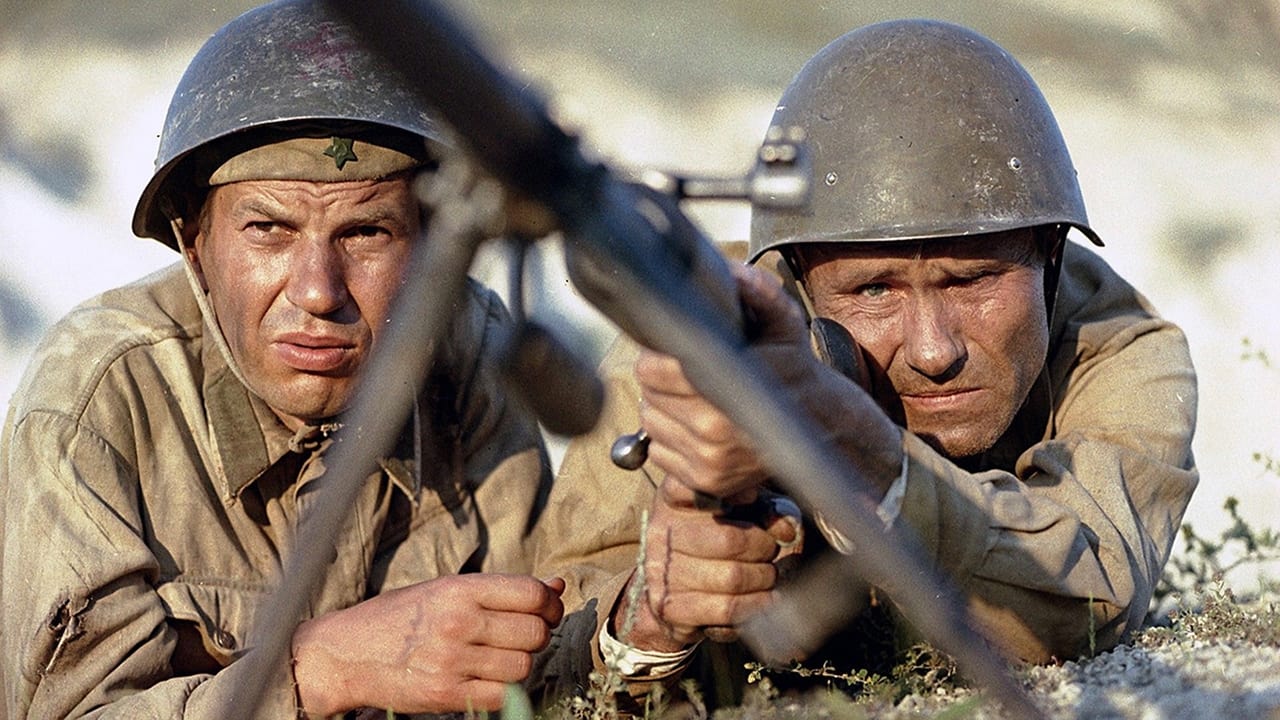Diego Silva
This movie really surprised me. I discovered I was unfair when I underestimated the creative capacity of the soviet cinematographic industry -very well represented here by Sergei Bondarchuk. "A soviet movie released 30 years after WW2? Total bias and cheap nationalism", I thought when I crossed this piece. What I watched, on the other side, is a verisimilar and vanguardist view of the Eastern Front; a work more tied to denounce than to exaltation.The resistance of a maimed and disoriented small unit is the perfect background for Sergei; it's a soft earth garden ready to receive the seeds of war. This is the first time I see such good exploration of soldiers' emotions. The scenes reveal the human inside the uniform, the virtues and vices. The one who fears, hesitates and finds refuge in laugh is the protagonist of "They fought for their motherland". Vasiliy Shukshin (the soldier "Lopakhin") doesn't give life to its character; he borrows the life of real people, of thousands of displaced russians who fought under severe conditions and created a whole new living style in the front. The other actors were also convincing. The siberian soldier misses his wife, Lopakhin's partner sees death in everything, Nikolay can't be distracted from his pessimistic convictions, Lopakhin himself feels extremely bad before the death of a youngster... All those marginalized emotions are well illustrated through a touching realism.Furthermore, Sergei manages to create meaningful symbolisms. The running engine of the upside down tank predicts the empty fate of Wehrmacht, whose ruthless advance isn't translated into a real move, i.e. goes nowhere. The insistence of the young nurse is the best expression of the faith deposited in each soldier. The hard words of the old woman aren't supposed to rise the "mother-loses-sons" cliché, but to reinforce the necessity of fighting the enemy at all costs, of shedding blood. The blood that flows from Nikolay's ear in the last scene marks the legacy of the war, the experiences and sorrows that won't be forgotten. The soviet flag is not unfurled until the final, which could mean the glory of the motherland isn't complete until every single soldier bow down to duty.I could pass the whole day talking about this movie, but I fear I don't have much space here. This way, I'll be quickly with the other details: the scenery is very immersive; the music is somewhat exaggerated sometimes, though correctly placed; and panzers' strength isn't well described, since a single AT rifle shot (15mm, maybe?) would not destroy a tank. Actually, this two last points are my only criticism and will not influence significantly my final rate. Summarizing, Bondarchuk used all his geniality and resources to create this masterpiece of war cine. All the adversities the conventional heroes would not face are presented to the spectator. The excellence of war and all honour issues are undone; I could be one of those guys and you also. War realism at its best. I would be unfair again if I gave this less than 9.
tieman64
"The time is fast approaching when to call a man a patriot will be the deepest insult you can offer him. Patriotism now means advocating plunder in the interest of the privileged classes of the particular State system into which we have happened to be born." - Leo Tolstoy "Heroism on command, senseless violence, and all the loathsome nonsense that goes by the name of patriotism - how passionately I hate them!" - Albert Einstein "Patriotism is a pernicious, psychopathic form of idiocy." - George Bernard Shaw The legendary Sergei Bondarchuk directs "They Fought For the Motherland", a war film set in Russia during the second half of 1942. The film opens with a magnificent shot, a prowling camera gliding through swaying fields of wheat before finding the exhausted Soviet army trudging through a canyon far below. They're in full retreat, having been recently crushed by the invading might of a German Panzer division.We then spend some time with the men, watching as they rest and recuperate. They chat and trade stories, before their commander selects a few for a special mission. Turns out our heroes have been ordered to hold a ridge, their small infantry regiment tasked with holding back the German forces so that their exhausted comrades may withdraw back to Stalingrad, where the Russians are preparing to make an epic final stand. Sam Fuller did this sort of "rag-tag rear guard group of soldiers vs an approaching enemy horde" thing better and with more nuance and complexity, but Bondarchuk is the better visualist. His camera conveys the sheer boredom and exhaustion of these men, and his battle scenes are at times impressive, the expansiveness of the Russian countryside lending his battles a scale which most British and American war productions lack.The film eventually settles down into a predictable rhythm, alternating between giant battles and intimate moments of downtime, Bondarcuk allowing his cast's sentiments, fears and attitudes to gently unfold whenever the bullets aren't flying. The film reduces war to the usual traits - everyman soldiers, fatigue, fear, fun, friendship, boredom, heroism, horror, death, homesickness, cowardice, orders etc – and like most of these films, its attempts at portraying war with "balance" and "truth" can't mask how myopic it ultimately all is. A more poetic version of "Saving Private Ryan", the film was financed by the state and the Russian ministry of defence and serves only to glorify war, heroism, compliance, servitude, and act as a low-key form of propaganda.Like "Saving Private Ryan", the film also ends with sad shots of the Russian flag, close ups of the battered faces of warriors, old men dropping to their knees, utilises various subtle tactics toward propagandistic ends and sports a narrative in which we're manipulated into morning the loss of our everyman heroes, who bravely stood up against foes superior in number. By the time the film ends, a throwaway line urging us to hate our enemies, akin to "Ryan's" nationalistic/militaristic "earn this", goes by almost unnoticed. 7/10 – Worth one viewing.
dbborroughs
Its 1942. The war in Russia is going badly for the Russians. They are being slowly pushed back by the ever advancing Nazis. This is the story of a regiment who's slowly dwindling numbers try to survive and remain optimistic as they continue to try to prevent the enemy from ever reaching Stalingrad.This is a great war movie. As with all Sergei Bondarchuk films this is a movie that makes you think and feel by showing you what its like to be a lone man in a huge situation. We get to go inside the heads of the various characters and we see what its like to be in battle. The battle scenes are good as the Russian soldiers simply try to survive the strafing, the bombing and to keep the Germans far enough away that they don't have a good chance at killing them.In someways this film reminded me of Terrence Malicks's Thin Red Line which used similar techniques at times (for example: subjective camera, manipulation of the soundtrack, disjointed flashback.) Actually this movie reminded me of several other war films produced after its release and I'm curious if film makers like Francis Ford Coppola and others studied copies of this all but impossible to see film when they made things like Apocalypse Now.As good as the film is it isn't perfect. The film can come off as a bit too "rah rah" for mother Russia at times, even though the film ultimately speaks to the larger question of defending one's own home land. The film also is a bit unfocused in the second half as the film takes some odd turns; then again the second half has some of its most powerful imagery with the young nurse trying to save the wounded man in the bomb crater and the return of one soldier from hospital.See this movie. Its a great great war war film which only suffers when compared to some of the gems in the Sergei Bondarchuk back catalog of films.
ivanb-1
If u never seen this movie, you probably lost great part of "cinema" history. Best russian actors in most dramatic scenes of World War II ... it's like our fathers fought for us. I dont know if that possible to find this movie on english, but you must try.


 AD
AD


